Answer these simple questions and we will find you the BEST prices
Which type of solar quotes do you need?
It only takes 30 seconds
100% free with no obligation

Tell us what you need to find a matching specialist

Get free quotes from professionals near you

Compare offers and choose the one that best matches your need
- whatcost.co.uk
- Home Insulation
- Wall Insulation
- Cavity Wall Insulation
- Cavity Wall Insulation Cost
How Much Does Cavity Wall Insulation Cost? UK Price Guide

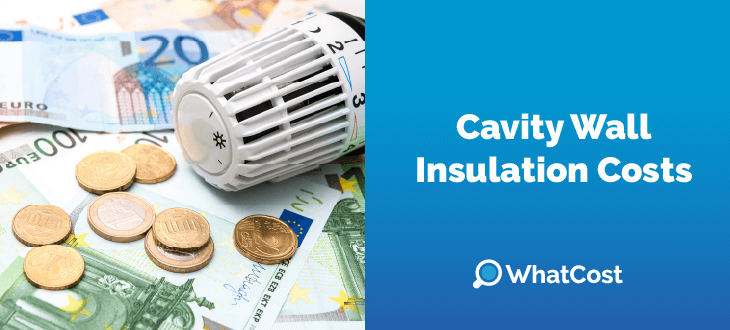
- Cavity walls comprise up to 75% of all properties throughout the UK.
- The average cost of cavity wall insulation, depending on the size and type of your home, can be around £1,000 - £4,600.
- Cavity wall insulation in a detached UK home can save £410 on annual energy bills.
Cavity wall insulation offers a significant return on investment, with potential energy savings of £110 - £410 annually. While the initial cost can range between £1,000 - £4,600 depending on your property size and type, this investment typically pays for itself within 10 years through massive reductions to your energy bills.
Why is cavity wall insulation so crucial? According to the Energy Saving Trust UK, uninsulated walls account for up to 33% of heat loss in homes. This leads to uncomfortable living conditions, high energy bills, and a substantial environmental impact.
Cavity wall insulation is a simple and non-invasive solution. The installation process usually takes only a few hours and provides boundless benefits. You might wonder; how much does it cost for cavity wall insulation? This comprehensive guide by WhatCost will explore all aspects of cavity wall insulation costs, including factors that influence the price and a detailed analysis of the pros and cons.
Ready to insulate your walls? Let WhatCost land you the best bargains. All you need is 30 seconds to fill out our online intake form, and we’ll send you up to 3 free home-tailored quotes directly from our network of trusted professionals. No costs or obligations. Simply click below to begin!
Cavity wall insulation cost in 2026
A cavity wall insulation cost for a 3-bed semi detached house can cost around £2,700, yet the final cost can vary significantly depending on several factors, including your property type, size, chosen insulation materials, how much cavity wall insulation you need, and the complexity of the installation process.
Here’s a breakdown of average cavity wall insulation costs based on your property type:
| Property type | Average total cost | Cost per 50m2 | Cost per 100m2 |
|---|---|---|---|
| Apartment/Flat | £1,100 | £650 + | £1,200 + |
| Mid-terrace house | £1,500 | £700 + | £1,400 + |
| Detached bungalow | £2,000 | £750 + | £1,500 + |
| Semi-detached home | £2,700 | £1,150 + | £2,300 + |
| Detached home | £4,300 | £1,150 + | £2,300 + |
It's important to note that this is a general estimate, and the actual cost can vary greatly. We recommend consulting with a professional insulation installer for a personalised quote tailored to your specific property and needs. They will be able to accurately assess your property and provide you with a detailed cost breakdown.
Additional costs
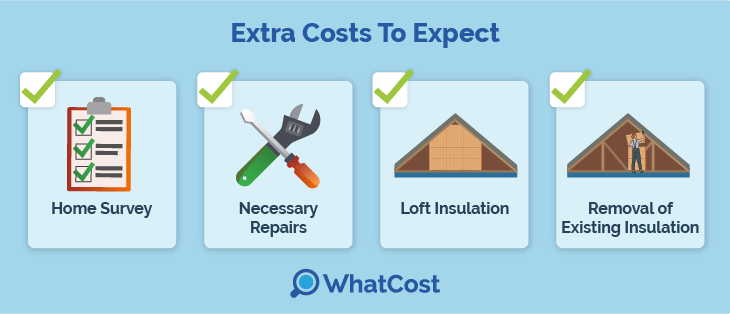
Beyond the base cost of cavity wall insulation, several other expenses may arise during the preparation and installation. While some are specific to individual properties, others are generally expected.
Here are some of the more common additional costs you may come across:
- Home survey: While most installers tend to provide a complimentary survey when you choose their services, further surveys may cost money. These assessments evaluate the condition of your walls, identify potential issues (cracks, existing insulation, wire locations), and ensure suitability for cavity wall insulation.
- Necessary repairs: Any cracks and openings to your walls must be addressed to ensure the insulation's effectiveness and prevent dampness. Loose wall ties, which connect the inner and outer walls, require replacement for structural integrity and proper insulation performance. Costs typically range around £30 - £50 per m2.
- Loft insulation: Many companies offer discounted combined wall and loft insulation packages. Loft insulation is crucial, as uninsulated lofts contribute another one-third of home heat loss. In many cases, it is much more feasible to insulate both your walls and loft with the same installer.
- Removal of existing insulation: If your home's older insulation is compressed, damaged, or contaminated, it may need to be removed. Depending on the property's size and complexity, removal costs can be between £1,600 £2,600. Some companies offer packages that include both removal and new insulation.
The best way to ensure you get the best bargain on your cavity wall insulation job is to work with a professional installer. That way, you can have the best course of action tailored to your home's specific needs and conditions. With WhatCost, you can save endless hours of painstaking research and vetting!
All it takes is 30 seconds to fill out our online form. In return, we’ll send you up to 3 free home-tailored quotes straight from our network of pre-vetted professionals, free of charge! Simply click below to begin and let the bargains come to you.
Cost of cavity wall insulation per m2
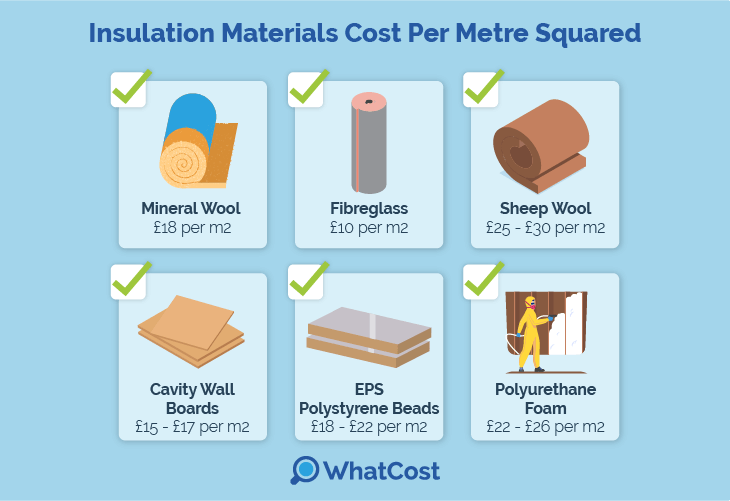
The price of cavity wall insulation materials can range significantly, typically from £13 - £30 per square metre. In most cases, these materials are injected through holes drilled in the outer leaf of the cavity walls and then sealed with cement for a seamless finish.
A cavity wall injection insulation cost depends on your chosen material. The most common cavity wall insulation types include:
- Mineral wool: A budget-friendly and sustainable option, mineral wool costs around £13 - £18 per m2, making it one of the cheapest cavity wall insulation options. Made from recycled rock, it's blown into the cavity and provides good insulation while being mould and flame-resistant.
- Fibreglass: Similar to mineral wool, fibreglass is made from recycled glass products spun into a blanket. It costs an affordable £10 per m2 and is very sustainable. Compared to cheap cavity wall insulation, fibreglass is a superior choice.
- Sheep wool: This natural and sustainable option, while pricier at £25 - £30 per m2, offers excellent insulation and is even hypoallergenic. It’s important to note that this method would require airtight walls to ensure moisture and pests don’t enter.
- Cavity wall boards: More suitable for new builds, these rigid boards (often made from PIR) cost around £15 - £17 per m2 and provide exceptionally high levels of insulation. They are installed whilst the wall cavity space is still exposed.
- Expanded polystyrene beads (EPS): A blown bead insulation cost is around £18 - £22 per m2. EPS beads are moisture-resistant and expand to fill the cavity. They are also recyclable, highly resistant to weathering and allow for ventilation, making them one of the best options today.
- Polyurethane foam: This highly effective but less environmentally friendly option, costing £22 - £26 per m2, is made from synthetic polyurethane. This liquid is injected into the cavity space, expanding to form an airtight seal. A downside is that it can release harmful VOCs during and after installation, as well as cause moisture issues.
Many installer companies provide a cavity wall insulation cost calculator on their sites, which allows you to form a rough estimate based on your chosen material, home type and size. Whilst these are not as accurate as quote prices, it can be a place to start!
While mineral wool tends to be the most affordable, polyurethane foam offers the highest performance. Expanded polystyrene beads provide a good balance of cost, effectiveness, and sustainability, making them one of the most popular materials gaining traction in the industry. For a more accurate cavity insulation cost, consult a professional installer.
What affects the cost of cavity wall insulation?
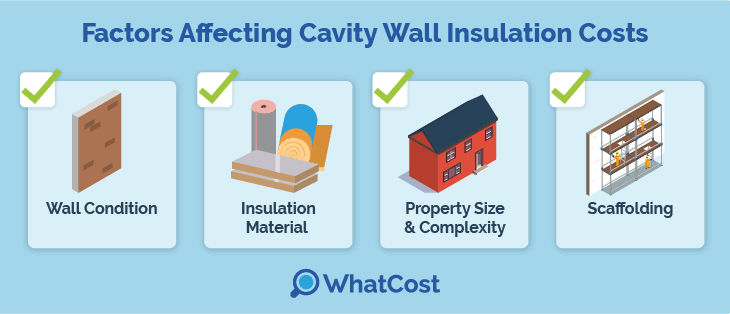
Factors beyond your chosen insulation material can affect an injected cavity wall insulation cost. A whole host of factors contribute to the overall cost of cavity wall insulation. These can include:
- Wall condition: Your walls must be in good condition with no significant damage, openings, or faulty brickwork. The cavity width is crucial. Ideal cavity widths typically range from 100mm to 150mm. Narrower cavities may increase installation complexity and potentially raise costs. A professional assessment will determine if your property is suitable for cavity wall insulation and identify any necessary repairs beforehand.
- Insulation material: The choice of insulation material significantly impacts the cost. While more expensive options like sheep wool often offer superior insulation and environmental benefits, budget-friendly options like mineral wool are also available. Consider factors like thermal performance, environmental impact, and your budget when selecting a material.
- Property size and complexity: The size of your home directly influences the amount of insulation required and therefore the overall cost. The complexity of your home's structure, including the number of walls, their layout, and the presence of extensions, also plays a role. Homes with intricate designs or multiple extensions may require more labour and potentially increase costs.
- Scaffolding: If scaffolding is necessary to access certain areas of your home, it will add to the wall cavity insulation cost. Scaffolding costs can vary significantly depending on the size and complexity of your home.
By carefully considering these factors and obtaining professional advice, you can make informed decisions about your cavity wall insulation project and ensure a cost-effective and successful outcome.
Grants options to help with cavity wall insulation costs
The UK government is set to launch the Warm Homes Plan in April 2025, a comprehensive initiative to improve home energy efficiency and reduce carbon emissions. This streamlined program provides up to £15,000 per property for energy performance upgrades like insulation and draught-proofing, and another £15,000 for low-carbon heating systems, especially for off-gas homes.
The plan will run for 3 – 5 years and be administered by local authorities to ensure targeted support within their regions.
If the cavity wall insulation prices seem prohibitive, you're in luck. The UK government offers several insulation grants to assist eligible households with the expense.
- Government schemes: Two prominent programs are the Great British Insulation Scheme (GBIS) and the Energy Company Obligation (ECO4). Both the GBIS scheme and ECO4 aim to improve energy efficiency in homes and typically target low-income and fuel-poor households. While eligibility criteria overlap, it's advisable to apply early to increase your chances of receiving assistance.
- Energy supplier grants: Many UK energy suppliers, including British Gas, EDF Energy, E.ON, Npower, SSE, Scottish Power, and others, offer grants and support for cavity wall insulation, either through their own initiatives or as funnels to government schemes.
These cavity wall insulation grants can significantly reduce the financial burden of improving your home's energy efficiency through cavity wall insulation.
Does the cost of cavity wall insulation pay off?
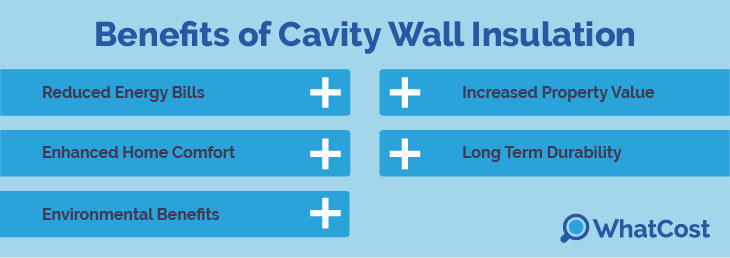
Cavity wall insulation is a highly worthwhile investment for homeowners, typically able to pay itself off in just 10 years. While there's a significant upfront cost involved, the long-term benefits don't stop there.
Here are some other ways that cavity wall insulation significantly outweighs its initial expense:
- Reduced energy bills: Poorly insulated homes waste a significant amount of heat. Cavity wall insulation can reduce heat loss by up to 33%, translating to substantial energy bill savings. For a detached UK home, this can amount to annual savings of up to £405. The average payback period for the investment is typically around 10 years.
- Enhanced home comfort: Uninsulated walls can lead to cold spots, drafts, and condensation, creating an uncomfortable living environment. This can also contribute to the growth of mould and dampness, which can negatively impact indoor air quality and potentially cause respiratory issues. Cavity wall insulation helps maintain a more consistent indoor temperature, keeping your home warmer in winter and cooler in summer.
- Environmental benefits: UK housing contributes significantly to the country's carbon emissions. Cavity wall insulation helps reduce your carbon footprint by minimising heat loss and reducing reliance on fossil fuels for heating. For a detached home, this can result in a reduction of around 1.1 tonnes of CO2 emissions per year.
- Increased property value: Homes with higher energy efficiency ratings (EPC) are more desirable to buyers and renters. Cavity wall insulation significantly improves a home's EPC rating, potentially increasing its market value.
- Long-term durability: When installed correctly, cavity wall insulation can last for decades, often up to a century. Regular wall inspections are recommended to identify and address any potential issues that could affect the insulation's longevity.
- Soundproofing: While cavity wall insulation can improve sound insulation to some degree, it's not its primary function. Some insulation materials, such as mineral wool or spray foam, offer better soundproofing properties than others. For optimal soundproofing, consider implementing other soundproofing measures.
Older homes may contain outdated insulation materials like formaldehyde foam, which can pose health and safety risks. Professional removal of old insulation is crucial before installing new cavity wall insulation.
Cavity wall insulation offers a compelling host of benefits, making it a wise investment for any homeowner looking to enhance their home's energy efficiency and create a more comfortable and healthy living environment.
Get multiple quotes to find the best cavity wall insulation price
Insulating your cavity walls is a significant investment in your home's energy efficiency and comfort. To ensure you receive the best results and long-term benefits, it's crucial to choose a qualified and reputable installer to get a cavity wall insulation quote.
Look for installers certified to PAS 2030 - 2035, a UK government standard that guarantees high-quality installation practices. Consider membership with the Cavity Insulation Guarantee Agency (CIGA), which provides up to 25 years of warranty coverage.
Also, compare quotes from multiple installers to find the best value for your budget. While this process may seem time-consuming, it's essential for making an informed decision. WhatCost can simplify this process by connecting you with trusted installers in your area. We'll help you find the right solution for your home and ensure a smooth and successful installation.
All you have to do is spare 30 seconds to fill out our online form, and we’ll send you up to 3 free home-tailored quotes from our nationwide network of professionals. The best part? Our services are completely free of charges and obligations. Simply click below to begin!
FAQ
The initial cost of cavity wall insulation can be around £1,000 – £4,600, depending on your home’s size and type. However, there may be additional costs associated with the preparation and installation of cavity wall insulation.
Cavity wall insulation can cost between £ 1,600 and £2,600, depending on the property’s size and complexity. Some companies offer packages that include both removal and new insulation.
The two main government grant schemes currently administering cavity wall insulation in the UK are the Great British Insulation Scheme (GBIS) and the Energy Company Obligation (ECO4). In addition, the UK government will announce its new Warm Homes Plan, which will streamline the funding process from April 2025.
Cavity wall insulation is one of the most beneficial home upgrades for higher energy bill savings, lower carbon emissions, and a temperature-regulated home that is healthy and comfortable to live in. Cavity wall insulation is also able to recoup its costs within just 10 years.
The cost of cavity wall insulation materials can range significantly, typically from £13 – £30 per square metre. The final costs depend on a range of factors such as your chosen material, installation complexity, and any outstanding repairs that may need carrying out.

Akif has a keen interest in green home improvement solutions and the role of digital media in identifying climate trends. He aims to provide a multidisciplinary approach to content rooted in credible research and accuracy.
- How Much Does Cavity Wall Insulation Cost? UK Price Guide
- Cavity wall insulation cost in 2026
- Cost of cavity wall insulation per m2
- What affects the cost of cavity wall insulation?
- Grants options to help with cavity wall insulation costs
- Does the cost of cavity wall insulation pay off?
- Get multiple quotes to find the best cavity wall insulation price
- FAQ
